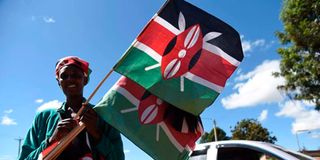Let’s do a rescue plan for Kenya

A hawker sells Kenyan flags in Eldoret town, Uasin Gishu County during Jamhuri Day celebrations at Central Primary School grounds on December 12, 2019.
What you need to know:
- Government has, in many ways, become an enterprise of pouring public funds into the pockets of a few well-heeled ‘tenderpreneurs’.
- Corruption in Kenya is a coalition of the elite against the people. Every facet of the State is represented in that coalition.
You can think of the contents of this column as nuggets for a manifesto for the revolution that I think needs to happen around here for us to reclaim our place among nations with a future.
Last week, I wrote about my fears about our country losing out and becoming another third-rate African nation rather than the competitive, open, fair and prosperous society that we want it to become. So the question that I’ve been asking myself is: What do we do about it? This depends on what you think the problem is. These, by the way, are my personal views as a citizen and should be taken as such.
I think the biggest problem for us is the political and governance risk posed by the political class and their commercial cousins in the tender business.
Government has, in many ways, become an enterprise of pouring public funds into the pockets of a few well-heeled ‘tenderpreneurs’ and those funds are used to subvert the Republic by funding the buying of elections and the undermining of the processes of law and order.
Corruption in Kenya is a coalition of the elite against the people. Every facet of the State is represented in that coalition.
Let me give the example of the cartels that rob us of our land. A politician will protect the various criminals in the gang, give them access to even more important politicians and grant them an air of respectability and legitimacy as “businessmen”. The criminals will build a network bringing together the courts, police and provincial administration.
Land grabbers
When they move and take your property, the police will pretend they are helping you while manipulating the situation to put you deeper in a corner. The courts will give orders that will, in effect, dispossess you. Within the government, other members of the network will align the Lands registry so that documents are stolen and new ones introduced.
So if unknown people invade your home in Karen, escort you out and lock the gate, you will run to the nearest police station. You will find a senior officer who will express outrage at the injustice done to you and swear that he/she will leave no stone unturned until he or she gets you justice.
You will be relieved that help is at hand, that you have, finally, found an “honest” servant of the people. He/she will advise you to go to court and get him/her an order that will give them the strength to “teach these grabbers a lesson”.
He/she will cleverly manoeuvre to ensure that you offer “facilitation”, which will be a double benefit to him/her. First, it will win your trust. There is no more gullible a fool like a Kenyan who has paid a bribe. Secondly, it is more money in his/her pocket.
In court, the judge will look at you with great compassion, perhaps even balance tears, hang on to your every word and take copious words. Finally, carefully avoiding your horrified eyes, he/she will rule that the status quo be maintained and gives a hearing date in eight months.
The order will be vague enough to give the thugs room to have their way with your home. Even in your sleepy, tired, hungry, stressed and distraught state, you will know that the order legitimises the invasion by reducing you from owner to complainant and does not stop the invaders from demolishing your home, subdividing your land and selling it off to profiteers.
precise and realistic plan
Every illegal deal involves such a network. The solution must involve disrupting these networks and, therefore, must be preceded by significant changes in the three arms of government. If you replace the government and leave Parliament intact, you are wasting your time.
At the next election, we must elect people who are not in it to steal our money but to fix the country. And we must give them the trust and confidence they need to turn it upside down. But we must always stay involved to ensure that they don’t go rogue and join the cartels. This means reviving Kenya’s feisty civil society.
Secondly, we need a new, more precise and realistic plan. Where are we going as a country? If you arrive at Country Bus one morning, pick a bus at random, get in and sit, you will arrive at any random destination. For you to choose the right bus, you must start with a destination. We ought to have a robust discussion about where we want to go and develop a shared understanding of our destination. After that, we can do a plan of how to get there.
I shall not have the space to go through all my arguments but let me make one more. Sometimes, outcomes don’t have the direct cause you would expect. For example, the weather might have more impact on our welfare than government action. If it rains, we have food, the cost of living goes down and we are all better off.
Similarly, state failure in Somalia led to the rise of militancy, which, through spectacular attacks, drove a punch into the stomach of Kenyan tourism, caused the diversion of taxes from services such as health and education into security and may also have contributed to the securitisation of the Kenyan state.
Whatever solutions we design for our shared future, they must be clear-eyed and take into consideration some of the self-evident risks we dare not speak.





